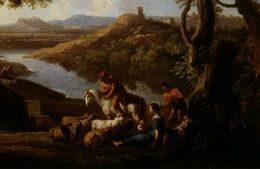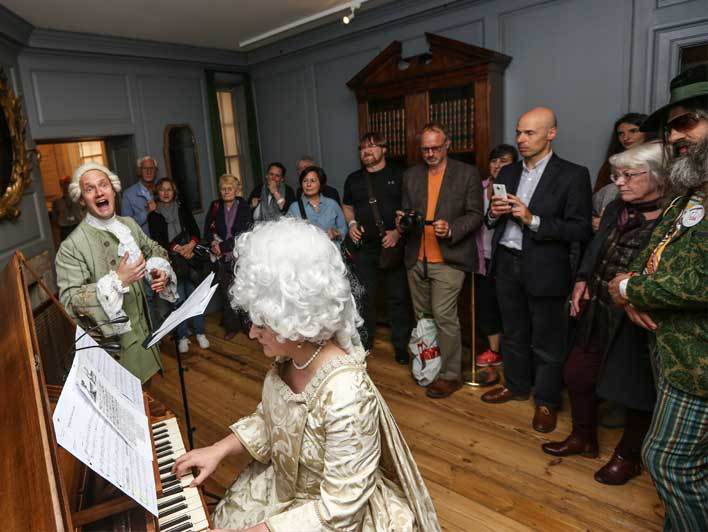IL PASTOR FIDO (HWV 8a)
Libretto: Giacomo Rossi, after the play by Battista Guarini
First performance: 22nd November 1712, Queens Theatre, London
Cast
- Valeriano Pellegrini (Soprano castrato)
- Valentino Urbani (Alto castrato)
- Elisabetta Pilotti-Schiavonetti (Soprano)
- Margherita de l'Epine (Soprano)
- Jane Barbier (Contralto)
- Richard Leveridge (Bass)
Synopsis

[The scene is Arcadia, where for many years the people have been suffering under a terrible burden. Each year they must sacrifice a virgin, to assuage the demands of the Goddess Diana. The Oracle has prophesied that this punishment can only be lifted with the marriage of two ‘of the heavenly race’ one of whom will be ‘a Faithful Shepherd’. Amarilli and Silvio, both of divine descent, have been identified as the couple whose marriage will lift the curse, and their fathers have arranged a betrothal.]
Act I
In the countryside of Arcadia, adorned with woods and fountains, Mirtillo wanders disconsolately pondering his hopeless love for Amarilli. He remains constant in his affections for her, although she has rejected all his advances. He goes to look for her.
Now Amarilli herself appears, in equal torment. She comments that the match with Silvio is unlikely to succeed, since he avoids her at every possible opportunity and is dedicated to Diana, the hunt and chastity. He is a determined enemy of love. Worse still, she has fallen in love with a young stranger of unknown parentage, Mirtillo. She must be cruel to him; otherwise she will fall foul of the law since she has been betrothed to Silvio. Yet she does love Mirtillo. As she confesses her love, Mirtillo returns and overhears. He goes to embrace her, but she again rejects him. His wooing becomes more intense, and her denials sharper. At last, she runs off.
Mirtillo resolves on suicide. He is about to kill himself when Eurilla enters. She stops him, and when she learns that love causes his torment, she hopes to gain his affection. Soon, however, she discovers that it is Amarilli whom he loves; unless he wins her, he will still kill himself. Eurilla decides to pretend that she will help him to obtain Amarilli. Mirtillo goes off happily. Eurilla decides to use deceit to alienate Mirtillo from Amarilli and to win him for herself.
Silvio enters singing happily of his devotion to Diana. As he talks of his ‘Goddess’, Dorinda enters. She is in love with Silvio, and for a while mistakes his talk for praise of her and her love. Once she is disabused, Silvio mocks her, but she continues to sing sadly of her love. Silvio renews his vow to Diana, and disdains Cupid.

Act II
The scene is a countryside with mountains. In the background is the entrance to a cave. Mirtillo waits alone for Eurilla. He lies down under a tree, and singing a gentle lullaby, falls asleep. Eurilla enters while he sleeps, carrying a garland of flowers with an inscription: ‘Your vows are dear to me, and I await you there’. She tip-toes in, places the garland in Mirtillo’s arms while he sleeps, and leaves stealthily. Mirtillo awakes and examines the mysterious gift. He soon imagines it must be from Amarilli. While he rejoices, Amarilli wanders by. She hides and observes him as he prepares for an amorous rendez-vous.
Alone, Amarilli believes Mirtillo to be unfaithful. She is just overcoming her jealousy when Eurilla enters. Eurilla is only too happy to fan the jealous flames. Amarilli admits that she prefers Mirtillo to her betrothed Silvio. Eurilla leaves her in despair and informs her of the intended rendez-vous with ‘another Nymph’.
Silvio enters followed by Dorinda. She pursues him ever more eagerly; he disdains her ever more scornfully. He leaves to prepare his weapons for the hunt. Dorinda resolves to remain constant in her affection for Silvio. The sun, she says, remains glorious even though clouded.
Mirtillo enters, led in by Eurilla. She has led him to believe that Amarilli will meet him in the cave, and that the wreath is from her as well. Mirtillo embraces Eurilla thankfully. Now Eurilla leads on Amarilli and convinces her to hide in the cave to spy on Mirtillo. She agrees reluctantly, but is unable to believe him unfaithful unless she sees it with her own eyes. She enters the cave.
Mirtillo arrives and Eurilla hurries him into the cave as well. Eurilla now puts her plan into effect. She will tell the ministers of justice anonomously that the lovers are in the cave. By Arcadian law, Amarilli will be executed, and Mirtillo will be free to marry her.

Act III
In a great wood with a view of the Temple of Diana, Dorinda waits alone. To catch a glimpse of Silvio as he passes in the hunt, she hides in a thicket. Silvio enters with his band of hunters. Suddenly Silvio sees movement in the thicket, and supposing it to be a good omen from Diana, hurls his spear into the undergrowth. Dorinda is carried out of the thicket by the hunters, wounded. Dorinda is willing to die at the hands of her beloved, but Silvio is overcome with remorse. As he kneels to staunch Dorinda’s blood, he feels a new emotion – love! They exchange vows and Dorinda is carried off. Silvio confesses the power of love and repents of his former severity.
Eurilla enters celebrating the success of her machinations. Amarilli, caught in the cave with Mirtillo, has been found guilty of unchastity and condemned to execution by the axe. Silvio enters with Dorinda, who has one arm bound up. Both are rejoicing in their new found love. Eurilla puts on a face of sorrow and tells them of Amarilli’s fate. This turn of affairs frees Silvio from his betrothal to Amarilli. He goes off with Dorinda to seek approval for his new love. Eurilla, her audience gone, continues to rejoice at her successful deception.
Amarilli, dressed in sacrificial robes with a myrtle garland on her head, is led in by the priests on her way to death, sad to leave life without saying farewell to Mirtillo. Mirtillo rushes in to stop the ceremony. He offers to die in her place. Amarilli refuses. Each struggles to save the other.
Tirenio, the high priest of Diana, comes forward from the Temple. Silvio, Dorinda and Eurilla enter at the same time. Inspired by the Goddess Diana, Tirenio stops the cruel sacrifice. Mirtillo, he announces, is of divine lineage and is the Faithful Shepherd of the prophecy. He announces an end to the human sacrifices and a double marriage between Amarilli and Mirtillo, and Dorinda and Silvio. Eurilla pleads for forgiveness. All join in praise of the inscrutable ways of heaven.
(c) Duncan Chisholm
Context
Handel followed the success of Rinaldo with a simple pastoral tale, perhaps to display his versatility after the grandeur of his heroic opera, or perhaps because the opera company was simply unable to afford more spectacular productions. But on this occasion he seems to have misjudged popular taste, and the opera was not a great success. After Rinaldo his audience was unimpressed by the simple sets and costumes and lack of spectacular stage effects. The opera diary of Francis Colman, a playwright and later Envoy Extraordinary at Florence, records that ‘The Scene represented only ye Country of Arcadia. ye Habits were old. – ye Opera Short’. Although pastoral comedies were popular stage fare at the time, Handel’s new London audience now demanded something more exciting.
It enjoyed more success when revived in 1734 – twice! On 18th May Handel presented an almost complete re-working of Il Pastor Fido, using only a small amount of the 1712 score and expanding it with additional arias and choruses culled from earlier works. There were only two new pieces written especially for this version. The cast was much more starry than his 1712 singers, with the part of Mirtillo being taken by the great castrato Giovanni Carestini. The second 1734 revivial opened Handel’s first season at the new opera house in Covent Garden. This time the story was enhanced by the presence of the famous French dancer Marie Sallé and her company. Additional dances were added, and a prologue was added under the title Terpsicore in the style of the French opéra-ballet that had been popularised by Rameau.
Although never one of Handel’s most popular operas, Il Pastor Fido nevertheless has some fine music. The great 18th-century music historian and critic Charles Burney wrote that that the opera ‘upon the whole, is inferior in solidity and invention to almost all his other dramatic productions, yet there are in it many proofs of genius and abilities which must strike every real judge of the art, who is acquainted with the state of dramatic Music at the time it was composed.’


